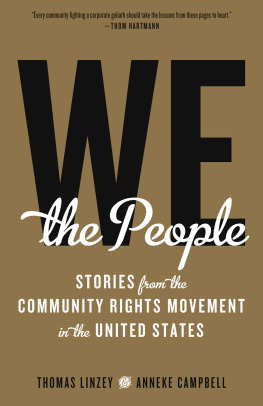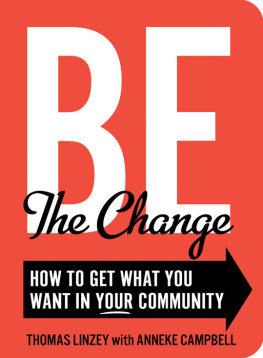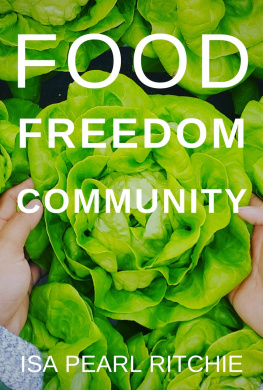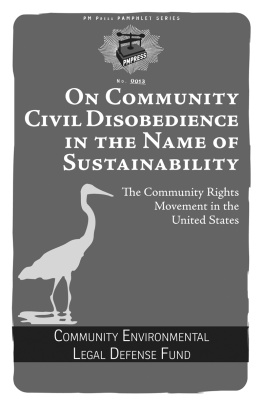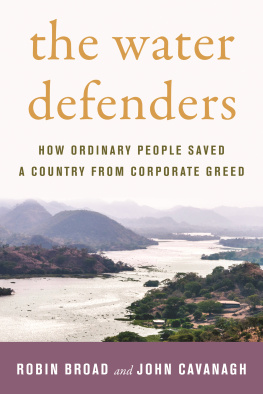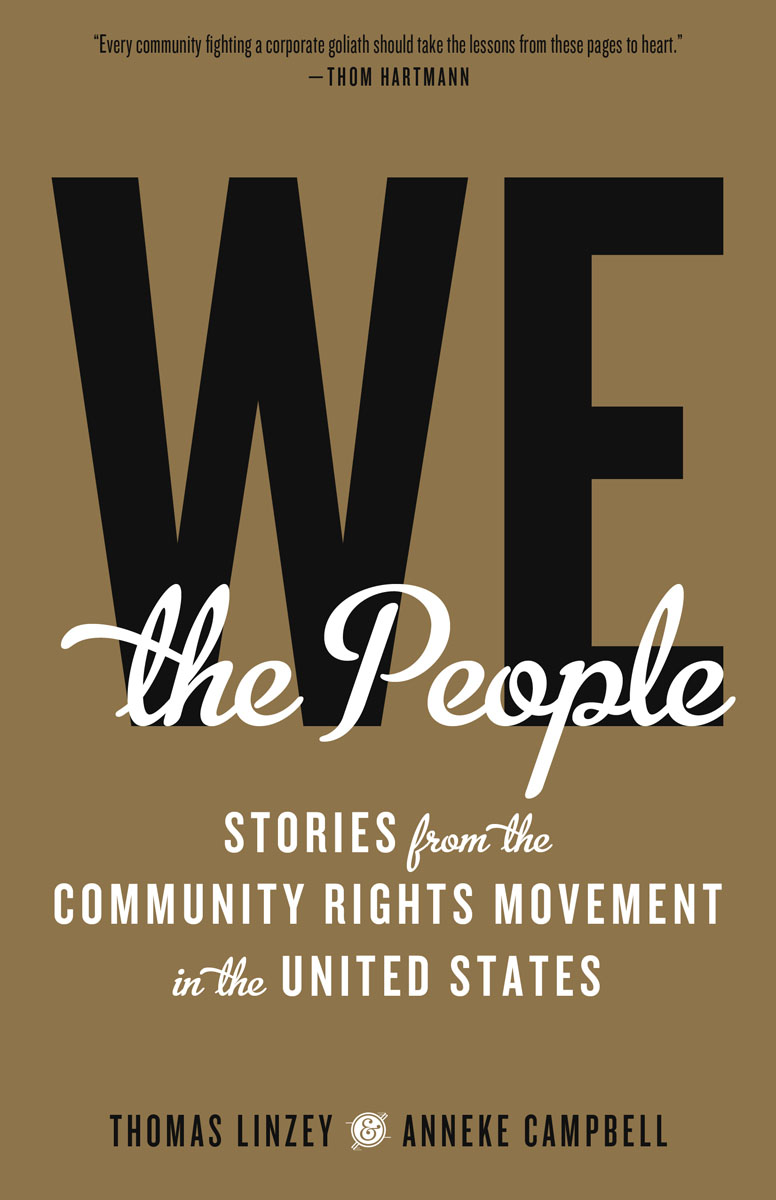
We the People: Stories from the Community Rights Movement in the United States
Thomas Linzey and Anneke Campbell 2016
This edition 2016 by PM Press
ISBN: 978-1-62963-229-2
Library of Congress Control Number: 2016948140
Cover by John Yates/stealworks.com
Interior by Jonathan Rowland
All images courtesy of CELDF (celdf.org) and We the People 2.0
(wethepeople2.film).
10 9 8 7 6 5 4 3 2 1
PM Press
PO Box 23912
Oakland, CA 94623
www.pmpress.org
Printed in the USA by the Employee Owners of Thomson-Shore in Dexter, Michigan.
www.thomsonshore.com
Never doubt that a small group of thoughtful, committed citizens can change the world. Indeed, it is the only thing that ever has.
Margaret Mead
To Stacey, Ben, Emelyn, Mari, Kai, Brad, Chad, Tish, Michelle, and Shannonthe ones who went first, and to all of the municipal officials and community leaders who have taken the plunge with them.
In memory of Gail Darrell.
CONTENTS
Preface
In the pages that follow, you will meet people from all walks of lifemen and women who have left their comfort zones to protect their communities from destruction, and who are now pushing for a new system of law that would guarantee all communities the power to make decisions about activities that affect them.
You will meet Gail Darrell from New Hampshire, who left her garden to stop water-bottling corporations from taking her towns water, and Michael Vacca, from western Pennsylvania, who poured concrete by day and tried to stop coal corporations from destroying his community by night. You will meet Cathy Miorelli, a local elected official and nurse who, at a diminutive five feet tall, fearlessly led her borough council in taking on some of the largest waste corporations in the state of Pennsylvania. You will meet Rick Evans, a labor organizer with the Laborers Union in Spokane, Washington, who is working with others to protect the constitutional rights of workers. And you will meet Cliff Willmeng and his mother, Merrily Mazza, who together protected their town, Lafayette, Colorado, from fracking by passing a Community Bill of Rights and who now head up the effort to amend the Colorado State Constitution.
If you met these people on the street, you wouldnt think twice about them. But if you were to meet them in city hall, in a town meeting, or in a public hearing, you would watch them transform into fighters for their community and advocates for the ability of communities to govern themselves.
These people not only know that the we the people of historical fame have the right to change the law when it no longer functions to protect our communities; they believe that we have a duty to do so. And theyre willing to devote their lives to making that real.
Its been a great pleasure over the past fifteen years to work with these people. All have become colleagues, and many have become close friends. Most importantly, none of them waited for someone to give them permission to act in defense of their communities. In other words, none waited for an environmental group to come along and try to save their community, or for a state or federal agency to do the right thing. On the other side of the coin, they refused to listen to anyone who told them there was nothing they could do to keep their communities from being destroyed.
They just did it. They did it because they had run out of hope that anyone else would.
And so they stood up and began reprogramming their local governments. They demanded that their elected officials find a new way to protect the rights of residents. In so doing, they transformed the members of their local governments from mere administrators of decisions handed down from above into the first wave of a movement toward sustainability through local self-governance.
That, of course, sounds complicated. But the people laying the groundwork for a broader movement would tell you that its actually quite simplethat theyre just bringing their local governments in line with the original sentiments laid out in the Declaration of Independence. And the one overriding principle from it that has been driven into every single state constitution is this: governments exist to protect the rights of people and communities, and when they stop doing so, they must be overhauled so that they do.
Giving up hope that someone else will do this for them has freed them to do whatever they need to do, which includes examining whether the system of law that currently exists in the United Stateswhich systematically deprives communities of the authority to stop fracking, pipelines, factory farms, and coal miningis really a democracy.
Giving up that hope has liberated them to take whatever steps they need to takestopping corporate projects in their communities, declaring that ecosystems have rights of their own that can be defended by people, forcing their local elected officials to resign when they refuse to do the will of community majorities, and getting sued for challenging court decisions that elevate the rights of corporations over the rights of people, communities, and nature.
Its structural change theyre after, because theyve become convinced that nothing short of that kind of change will actually take their communities off the defensive and put them in a place where they control their own futures. In short, they do it because theres nothing left to lose anymore in their communities. The cost of doing nothing has become more expensive than the cost of acting.
Many of the people who appear in the pages ahead have now embarked on an extended journeyjoining hands with others in their states to propose state and federal constitutional amendments recognizing a community right to self-government.
These people are convincedfrom the things theyve seen, heard, and experiencedthat nothing short of a complete overhaul of our system of law and government will solve the problems they face in their communities. And the results of their battles will eventually determine the course of a much larger challenge: whether we will continue to allow others to destroy our communities and the planet, or whether we will somehow find a way to align our governance and law with the state of the world in ways that dont.
So as you head into the pages that follow, we hope that you go beyond merely cheering for these folks who have pioneered a different kind of activism. They are relying on you to do the same.
In the end, youll hear them saying something quite simple: if your community is in the crosshairs of some corporation, its time to give up on the hope that others will help you. Get on with doing the work that will save your community and the places that you love. In taking action, you will become part of a group that, joining with others, will create a movement that will be impossible to stop and will change the face of this country forever.
Thomas Linzey
March 23, 2016
Introduction
Thomas Linzey, the Community Environmental Legal Defense Fund, and the Democracy School
T WELVE YEARS AGO, I SAT AMONG three thousand environmental activists gathered together for the annual Bioneers conferencea pantheon of rainforest protectors, GMO opponents, the elite of bio-mimicry designers and green tech innovators, as well as indigenous leaders and overworked environmental justice advocates, all present to gain inspiration and energy to wage the good fight for another year. I had not heard of the Community Environmental Legal Defense Fund, nor its founder, Thomas Linzey, but two minutes into his speech, we were riveted. When he declared, The only thing environmental regulation regulates is environmentalists, the audience cheered in recognition. There never has been an environmental movement in America, he continued, because movements drive rights into the Constitution, and rivers and cougars and ecosystems have no rights.
Next page
